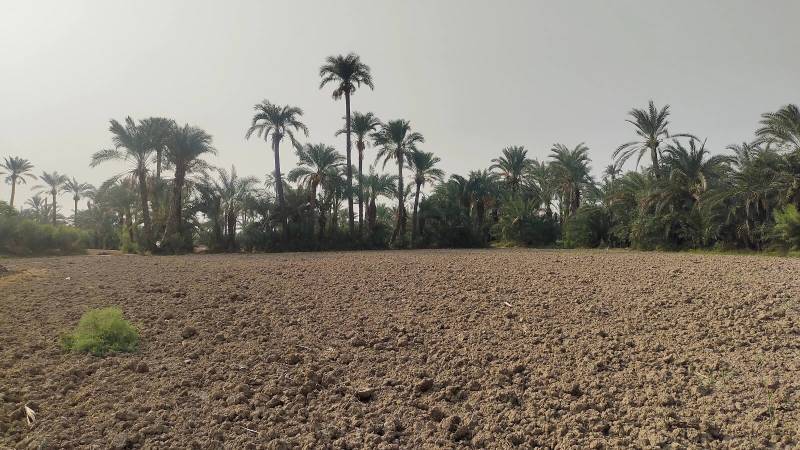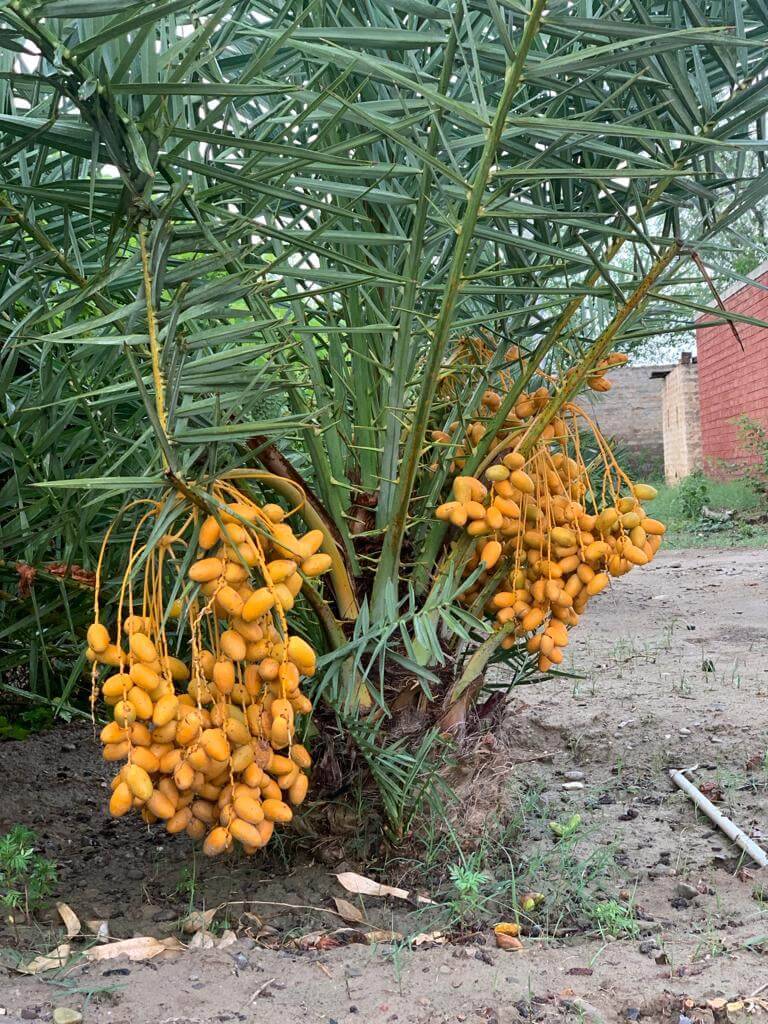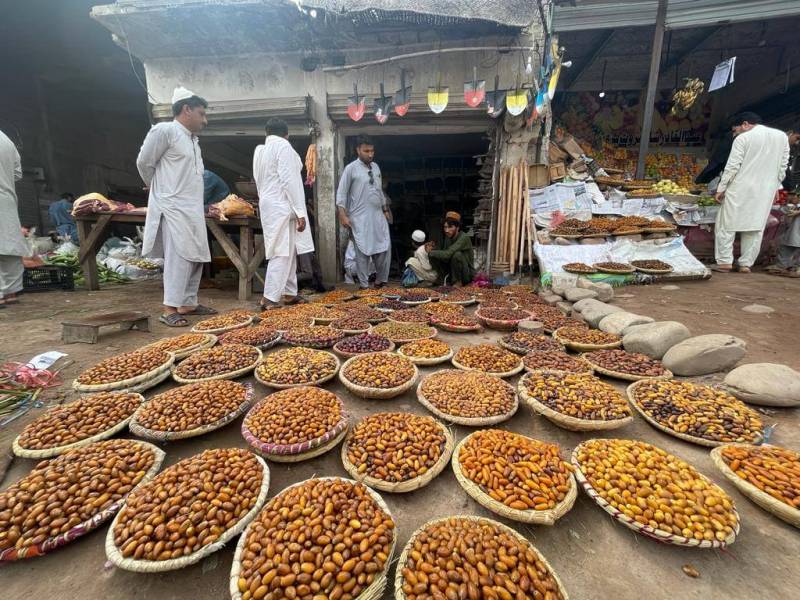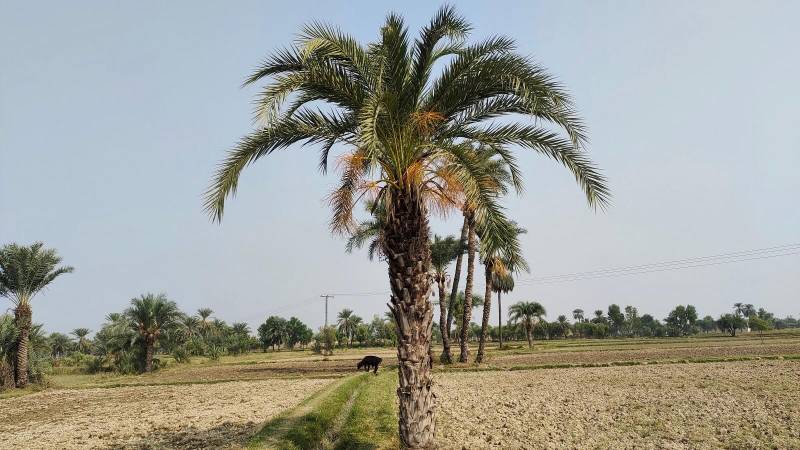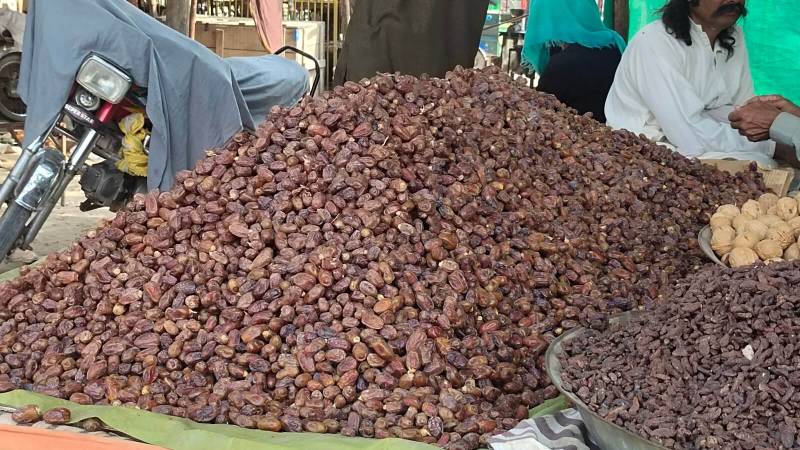Saif Ullah has been cultivating date palm trees for 50 years, following in the footsteps of his forefathers. In his orchard in Kotka Sher Khan Village, Lakki Marwat, he grows the 'Bombay' variety of dates, but he's encountered difficulties in the past two years in obtaining a sufficient yield from his trees.
Native date palm trees standing along the banks of rivers Ghambila, Kurram and Indus in districts of Dera Ismail Khan, Bannu and Lakki Marwat in southern Khyber Pakhtunkhwa (KP) are facing a climate crisis, with a significant decline in their quality and production over the last two years. Climate change has brought about extreme weather events, including hailstorms, floods, and prolonged hot summers, which have had a devastating impact on desi and other varieties of date palms in the area.
Saif Ullah explains that date palm trees start bearing fruit after five years and have a lifespan of over a century. Despite this, fruit-bearing times were significantly impacted by last year's heavy rainfall in June. “There has been an increase in pest attacks, and the government has not shown any interest in protecting them,” he says.
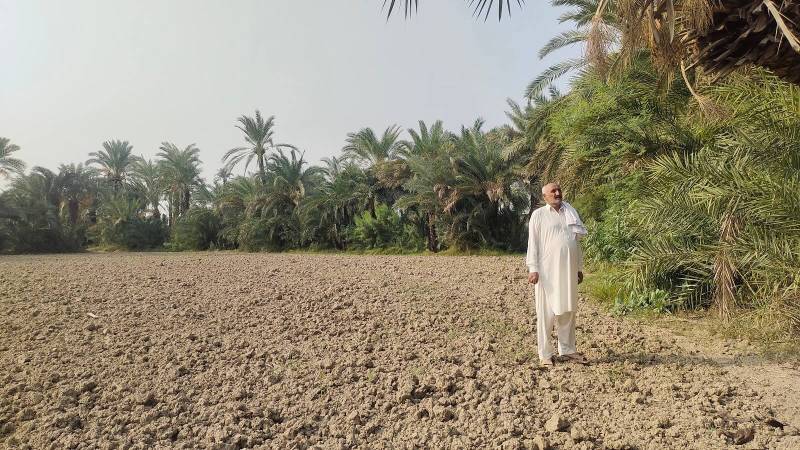
There is a lack of specific data available regarding both date farmers and projects designed to monitor and safeguard the plant from climate hazards in the area. Dr Rehmat Ullah, the Deputy Director of the Agriculture Extension Department in Bannu, informs that there are over 13,000 registered farmers with the department, but many of them are involved in multiple types of farming.
“Desi date palms are hardy plants, requiring warm weather. Dates in our area are harvested later than in Balochistan and Sindh. Flowering typically begins in February to March, with fruit production in June and July,” he explains.
However, over the last two years, dates have suffered due to climate change. In March 2023, heavy rains and hailstones wreaked havoc on date flowering, while in June, strong winds, rain, and storms in Bannu and Lakki Marwat damaged the ripening fruits.
Dr Rehmat Ullah added that climate change has long-term effects on other crops as well, but dates are facing various challenges, including increased pest attacks by borer worms. Rising temperatures in March and April provide favourable conditions for pests to thrive. Over the last two years, nearly 30 to 35 percent of date palms in the Bannu division have been affected by climate hazards – “Currently, the department is not working to mitigate the adverse effects of climate change and provide protection to farmers”.
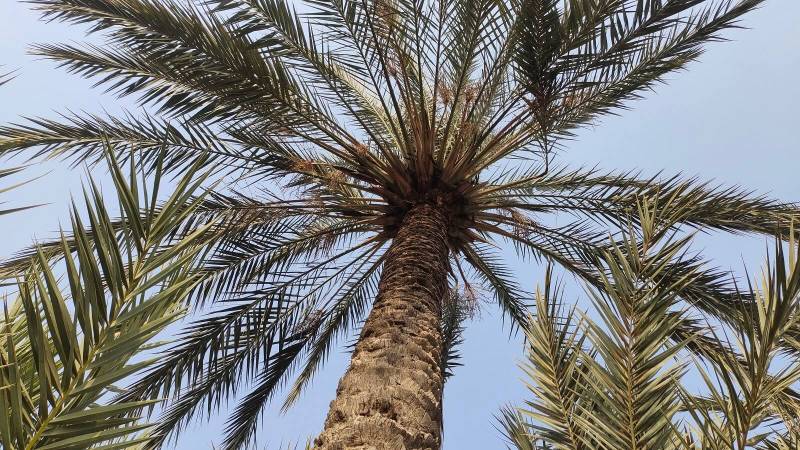
District Dera Ismail Khan holds the largest share in date palm production. According to the Khyber Pakhtunkhwa Crop Reporting Services Centre, date palms in KP were cultivated on 1,785 hectares, producing 14,571 tonnes in KP in 2019. Whereas Dera Ismail Khan cultivated dates on 1,140 hectares, resulting in a production of 13,831 tonnes.
Farkhanda Khan, Research Officer at DI Khan Agriculture Institute Ratta Kulachi, asserts that Dhakki, associated with Dhakki village, is one of the naturally evolved and more productive date varieties in Pakistan.
“Dhaki dates measure four to five centimetres in length, and, on average, a plant can produce up to 150 kilogrammes, which is higher than other date types,” she adds.
Over the last two years, dates have suffered due to climate change. In March 2023, heavy rains and hailstones wreaked havoc on date flowering, while in June, strong winds, rain, and storms in Bannu and Lakki Marwat damaged the ripening fruits.
She highlights that fresh or dried dates are rich in vitamins, minerals and fibre – “Dhakki dates are not only delicious but have naturally evolved over the past 40 years. They were first reported in 1994 and were officially registered with the Federal Seed Certification and Registration Department in 2005.”
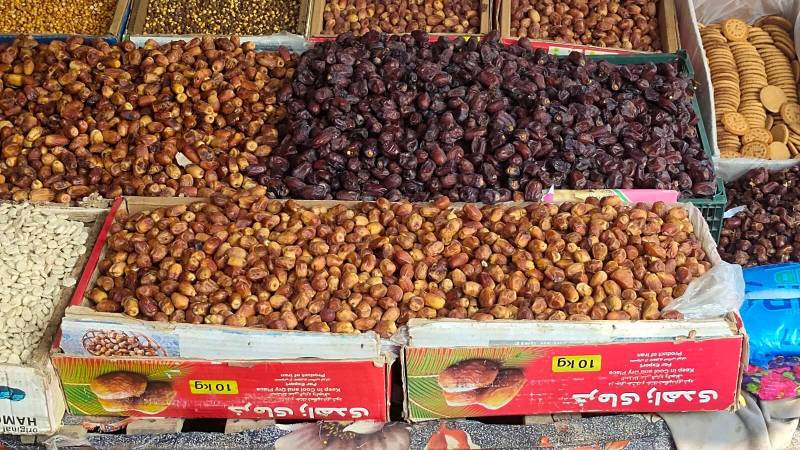
Khan mentions that the 2022 flood wiped out around 30% of date palms. “We are experimenting with dates on a small scale, and the results have been positive. The local farmers are experimenting with dry dates to create chowaras, which were exported to India, but due to an increase in taxes in 2019, the farmers became discouraged,” she says.
She emphasises that the DI Khan division has the potential to grow high-quality dates, like Balochistan and Sindh, but requires government support.
Farm to market
Saif Ullah sells his dates in the local market and expresses difficulties faced in marketing. “Unfortunately, the district government-related departments have not provided any assistance in this matter,” he says.
The issue of date marketing is not exclusive to Saif Ullah. Many other farmers in district Bannu, North Waziristan, and sub-division Bettani are also grappling with the same problem. Farmers are struggling to sell their dates effectively, and the government has not offered any support in this regard.
Rehmat Ullah agrees that due to the lack of proper marketing infrastructure, many farmers are not inclined to engage in date farming. He adds that Dhakki dates are successfully cultivated in the Bannu division, and some farmers have also attempted it in Lakki Marwat and Bannu. Nevertheless, “the department has not initiated any projects to further facilitate these farmers.”
Similarly, in Dera Ismail Khan, Dhakki dates have not received recognition and promotion from the government. Farkhanda Khan points out that Pakistan is the 6th largest producer and exporter of date palms in the world. In 2019-20, Pakistan exported dates worth $14.20 million to Nepal and dry dates valued at $1.13 million to Singapore. “If the government were to show interest and invest in the development of this sector, it could play a crucial role in boosting Pakistan's economy and uplifting local communities," she adds.
Lack of government interest
A government official associated with the agriculture department tells The Friday Times on condition of anonymity that the government is indifferent to promoting southern date palm cultivation. This is exemplified by a project designed in 2004, for which the government allocated approximately Rs39 million from the KP Export Development Fund. However, to date, the project has not commenced.
The official further explained that in 2020, a meeting was held with the ministers and officials from the Dera Ismail Khan Agriculture Division to kick-start the project. Unfortunately, after the dissolution of the KP government, the new caretaker government closed the project.
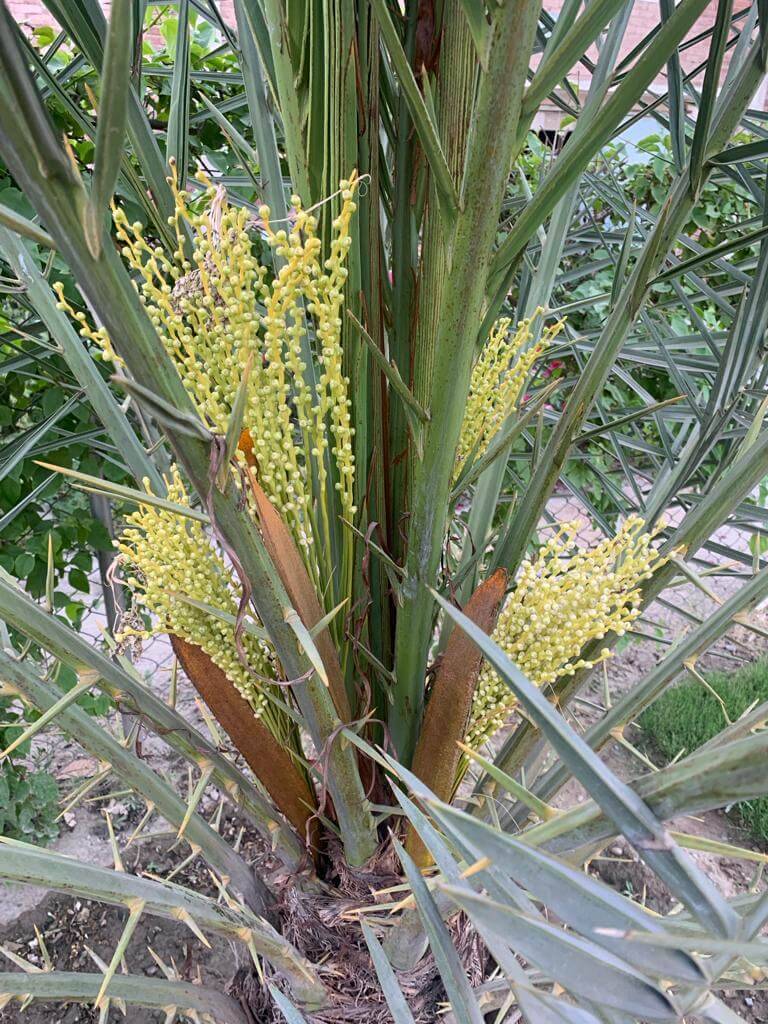
Additionally, the official informs that a smaller project titled Hybrid Innovations in Processing Technology of Dhakki Dates with Quality Retention, Packaging, and Value-Addition: A multifarious approach. This project began in 2021 and is scheduled to continue until 2024, supported by the Pakistan Agricultural Research Council (PARC) under the Agricultural Linkages Programme (ALP). However, it does not primarily focus on addressing the effects of climate change. “It has operated on a smaller scale and has become a subject of political controversy in Dera Ismail Khan,” the official states.
Impact of climate change
Pakistan is facing the visible impacts of climate hazards and is among the countries most severely affected by climate change. The effects of climate change include the increasing scarcity of water, unpredictable weather patterns, more severe and prolonged droughts, and the proliferation of pests and diseases.
According to FAO, date palm production and distribution systems play a significant role in value chains by promoting sustainable production systems and expanding exports, contributing to several Sustainable Development Goals (SDGs). However, various constraints within these value chains hinder the competitiveness of the date palm sector in local, regional, and international markets.
Pakistan has committed to achieving the SDGs, but no initiatives have been introduced by the government whereby local communities can improve their livelihoods. For example, promoting date palm cultivation in the southern region could bring about significant economic growth and enhance the quality of life for marginalised communities.
Agriculture experts in the Bannu and Dera Ismail Khan Division suggest that if the government prioritises the development of the southern date palm sector, it will not only boost the national economy but also empower local communities in the southern region.


